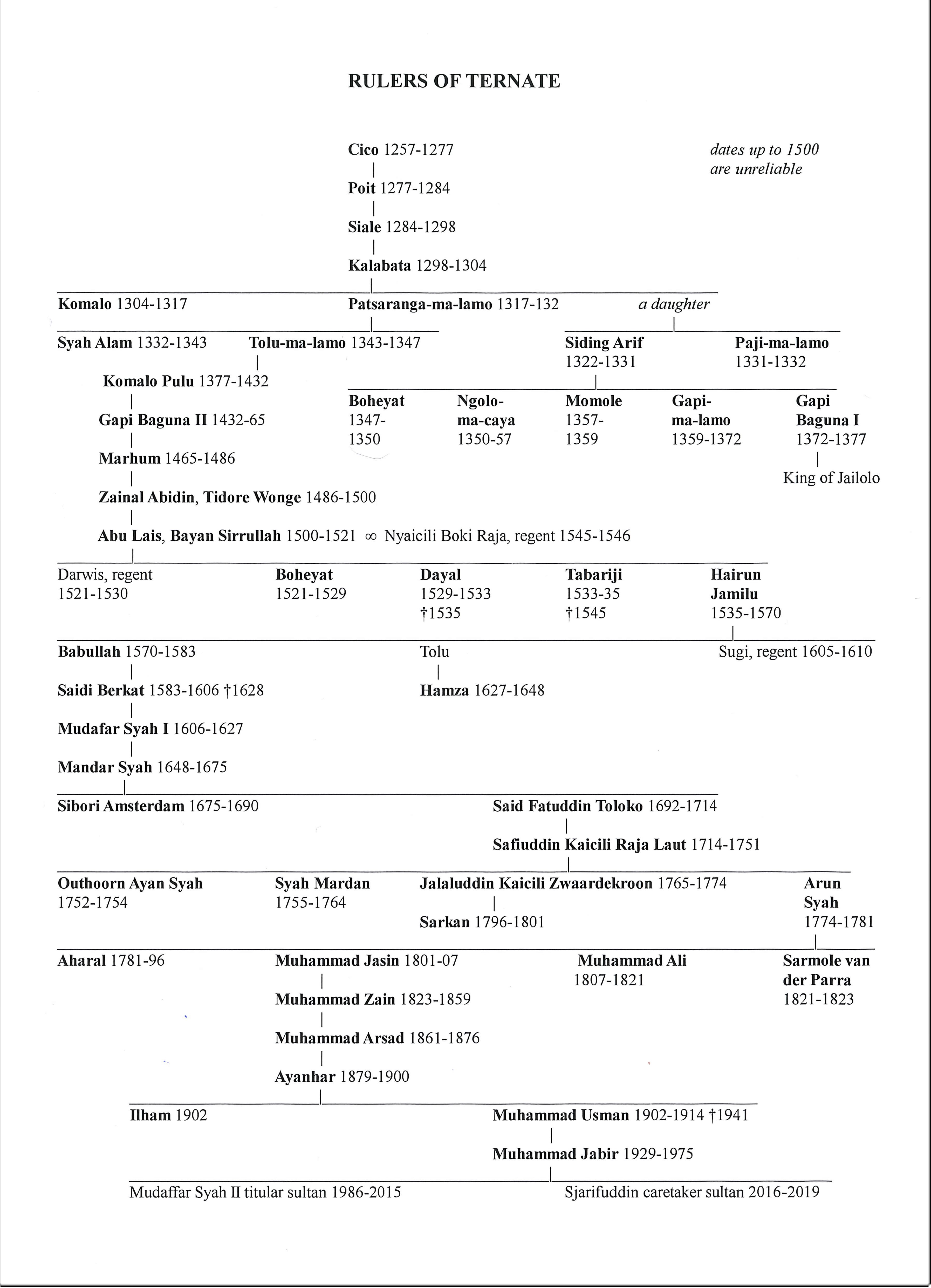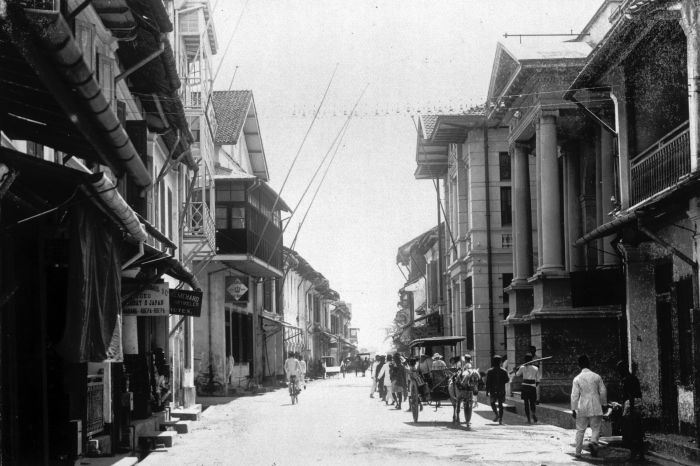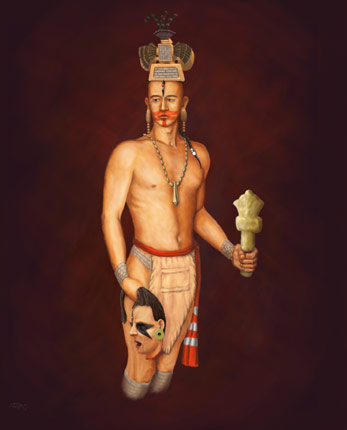|
Kingdom Of Bungku
The Kingdom of Bungku, also known as Tobunku or Tobungku, was an Islamic polity in present-day Central Sulawesi, Indonesia. It was located on the Southeast Peninsula of Sulawesi, in what is today Morowali Regency. Throughout most of its pre-colonial history, the polity was under a tributary relationship with the Sultanate of Ternate, with strong influence from Bugis merchants and the Bone State. Bungku was a trading and raiding center on Sulawesi's eastern coast, exporting slaves, iron, inland produce, and sea cucumbers among others. Its economic fortunes declined following a series of conflicts in the mid-nineteenth century, and it was subsumed under the colonial administration of the Dutch East Indies in 1905. It remained as an autonomous subdivision of the Dutch East Indies, and later Indonesia, until its absorption into Poso Regency in 1961. History Spanish explorer Andrés de Urdaneta in a 1525 account recorded the settlement of Tabuay, later known as Bungku, as a "lively ... [...More Info...] [...Related Items...] OR: [Wikipedia] [Google] [Baidu] |
Sultanate Of Ternate
The Sultanate of Ternate ( Jawi: ), previously also known as the Kingdom of Gapi, is one of the oldest Muslim kingdoms in Indonesia besides the sultanates of Tidore, Jailolo, and Bacan. The Ternate kingdom was established by Momole Cico, the first leader of Ternate, with the title ''Baab Mashur Malamo'', traditionally in 1257. It reached its Golden Age during the reign of Sultan Baabullah (1570–1583) and encompassed most of the eastern part of Indonesia and a part of southern Philippines. Ternate was a major producer of cloves and a regional power from the 15th to 17th centuries. The dynasty founded by Cico continues to the present, as does the Sultanate itself, although it no longer holds any political power. History Pre-colonial period The sultanate was originally named the Kingdom of Gapi, but later changed the name to be based on that of its capital, Ternate. Originally there were four villages in Ternate and led by clan leaders called Momole. Main activities of ... [...More Info...] [...Related Items...] OR: [Wikipedia] [Google] [Baidu] |
Treaty Of Bongaya
The Treaty of Bongaya (also spelled Bongaja) was signed on November 18, 1667, between Sultan Hasanuddin of Gowa and the Dutch East India Company (VOC). This treaty was developed after Dutch imperial forces (allied with the Bugis) defeated the Gowan forces at Makassar. Based on the terms of the agreement, Sultan Hasanuddin officially recognized the VOC's influence in Makassar territories (VOC recognition by the sultan was unofficially established in 1667). As a result, major restrictions were placed on Gowa's ability to trade. The treaty declared that all traders from Gowa required a license in order to do business in regions controlled by the Dutch East India Company. These territories included Buton, Makassar, Timor, Bima and the coasts of Java. See also *List of treaties This list of treaties contains known agreements, pacts, peaces, and major contracts between states, armies, governments, and tribal groups. Before 1200 CE 1200–1299 1300–1399 1400–1499 15 ... [...More Info...] [...Related Items...] OR: [Wikipedia] [Google] [Baidu] |
Lake Matano
Lake Matano (), also known as Matana, is a tropical lake in East Luwu Regency, South Sulawesi province, Indonesia, that is noteworthy for the unique environment in its deeper layers. With a depth of , it is the deepest lake in Indonesia (ranked by maximum depth), the 11th deepest lake in the world and the deepest lake on an island by maximum depth. The surface elevation from mean sea level is only , which means that the deepest portion of the lake is below sea level (cryptodepression). It is one of the two major lakes (the other being Lake Towuti) in the Malili Lake system. Lake Matano is considered an ancient lake, and it formed in a tectonic graben around 1 to 2 million years ago. Lake Matano and its catchment area have a large amount of endemic flora and fauna. The catchment area's soils and rocks make it have a relatively high amount of iron. Because the temperature on Sulawesi Island does not change much during the year, the epilimnion never gets cold enough to mix ... [...More Info...] [...Related Items...] OR: [Wikipedia] [Google] [Baidu] |
Kingdom Of Luwu
The Kingdom of Luwu (also Luwuq or Wareq) was a polity located in the northern part of the modern-day South Sulawesi province of Indonesia, on the island of Sulawesi. It is considered one of the earliest known Buginese kingdoms in Sulawesi, founded between the 10th and 14th century. However, recent archaeological research has challenged this idea. History Origin of Luwu In 1889, Dutch administrator of Makassar, Braam Morris placed Luwu's peak territorial extent between the 10th and 14th centuries, but offered no clear evidence. The La Galigo, an epic poem composed in a literary form of the Bugis language, is the likely source of the dating. Morris' theory combined two older concepts which were already common in the region, which are (1) the so-called 'primordial age' as described within La Galigo, and (2) the widespread belief of other Bugis polities in South Sulawesi, who viewed the rulers of Luwu as the most senior lineages of all Bugis rulers. However, historians and ... [...More Info...] [...Related Items...] OR: [Wikipedia] [Google] [Baidu] |
Raja Ampat Islands
Raja Ampat (), or the Four Kings, is an archipelago located off of the northwest tip of Bird's Head Peninsula (on the island of New Guinea), Southwest Papua , Southwest Papua province, Indonesia. It comprises over 1,500 small islands, cays, and shoals around the four main islands of Misool, Salawati, Batanta, and Waigeo, and the smaller island of Kofiau. The Raja Ampat archipelago straddles the equator and forms part of Coral Triangle, the Coral Triangle, an area of Southeast Asian seas containing the richest marine biodiversity on earth. The Coral Triangle itself is an approximate area west-southwest of the Philippines, east-northeast and southeast of the island of Borneo, and north, east and west of the island of New Guinea, including the seas in between. Thousands of species of marine organisms, from the tiniest cleaner shrimp and camouflaged pygmy seahorses to the majestic cetaceans and whale sharks, thrive in these waters. Administratively, the archipelago is part of the prov ... [...More Info...] [...Related Items...] OR: [Wikipedia] [Google] [Baidu] |
Tortoiseshell
Tortoiseshell or tortoise shell is a material produced from the shells of the larger species of tortoise and turtle, mainly the hawksbill sea turtle, which is a critically endangered species according to the IUCN Red List largely because of its exploitation for this trade. The large size, fine color, and unusual form of the hawksbill's scutes make it especially suitable. The distinctive patterning is referred to in names such as the tortoiseshell cat, several breeds of guinea pig, and the common names of several species of the butterfly genera '' Nymphalis'' and '' Aglais'', and some other uses. Uses Tortoiseshell was widely used from ancient times in the North and in Asia, until the trade was banned in 2014. It was used, normally in thin slices or pieces, in the manufacture of a wide variety of items such as combs, small boxes and frames, inlays in furniture (known as Boulle work carried out by André-Charles Boulle), and other items: frames for spectacles, guitar picks and ... [...More Info...] [...Related Items...] OR: [Wikipedia] [Google] [Baidu] |
Kendari
Kendari is the capital city of the Indonesian province of Southeast Sulawesi. It had a population of 289,966 at the 2010 CensusBiro Pusat Statistik, Jakarta, 2011. and 345,107 at the 2020 census,Badan Pusat Statistik, Jakarta, 2021. making it the most populous city in the province, and the fourth most on Sulawesi. The official estimate as at mid 2023 was 351,085 - comprising 176,279 males and 174,806 females.Badan Pusat Statistik, Jakarta, 28 February 2024, ''Kota Kendari Dalam Angka 2024'' (Katalog-BPS 1102001.7471) The city covers an area of , or about 0.7 percent of Southeast Sulawesi's land area. Located on Kendari Bay, it continues to be an important trade center, with the province's main port and airport. It is the economic and educational center of the province, home to various universities and colleges. Kendari has the highest Human Development Index (HDI) in Sulawesi. History Etymology The word ''"Kendari"'' is thought to come from a version of the word ''"Kandai"'' ... [...More Info...] [...Related Items...] OR: [Wikipedia] [Google] [Baidu] |
Koninklijke Paketvaart-Maatschappij
Koninklijke Paketvaart-Maatschappij (KPM, Dutch for Royal Packet Navigation Company), was a Dutch shipping line in the Dutch East Indies, now Indonesia. It traded form 1888 to 1966. It was the dominant inter-island shipping line in the Dutch East Indies in the last half-century of the colonial era. Foundation In 1863 the British-owned Nederlandsch-Indische Stoomvaartmaatschappij (NISM) won a tender for a number of subsidized shipping lines in the Dutch East Indies. As a consequence the inter-island shipping lines became centered on Port of Singapore, Singapore. Further, all but two of the many ships required were built in the United Kingdom of Great Britain and Ireland, United Kingdom. The minister of colonial affairs Jacobus Sprenger van Eyk and the businessmen Jan Boissevain (1836–1904), :nl:Willem Ruys (1837-1901), Willem Ruys, and PE Tegelberg responded with a plan for a new "national" shipping line. On 19 March 1888 a law was made to govern the relations between the (D ... [...More Info...] [...Related Items...] OR: [Wikipedia] [Google] [Baidu] |
Makassar
Makassar ( ), formerly Ujung Pandang ( ), is the capital of the Indonesian Provinces of Indonesia, province of South Sulawesi. It is the largest city in the region of Eastern Indonesia and the country's fifth-largest urban center after Jakarta, Surabaya, Medan, and Bandung.Ministry of Internal AffairsRegistration Book for Area Code and Data of 2013 The city is located on the southwest coast of the island of Sulawesi, facing the Makassar Strait. Throughout its history, Makassar has been an important trading port, hosting the center of the Gowa Sultanate and a Portuguese naval base before its conquest by the Dutch East India Company in the 17th century. It remained an important port in the Dutch East Indies, serving Eastern Indonesian regions with Makassarese fishers going as far south as the Australian coast. For a brief period after Independence of Indonesia, Indonesian independence, Makassar became the capital of the State of East Indonesia, during which an Makassar Uprising, u ... [...More Info...] [...Related Items...] OR: [Wikipedia] [Google] [Baidu] |
Kora Kora
A kora-kora or kora kora or coracora is a traditional canoe from the Maluku (Moluccas) Islands, Indonesia. They are naval boat for carrying men on raids for plunder or for slaves. In Maritime Southeast Asia, raiding for slaves was an honourable way of making a living, and the kora kora was needed for defence against raids as well as for forays. Large kora-kora is called juanga or joanga. Etymology The origin of the name is unknown, but it has been proposed that it may have been derived from the Arabic "قُرقور" ''qorqora'', the plural of ''qarâqir,'' meaning "large merchant ship". It is also likely that the origin of the names are native, with the meaning lost through time, as other Austronesian vessels with no contact with Arab traders also bear similar names like the Ivatan '' karakuhan'' and the Marshallese '' korkor''. The term may also comes from Spanish or Portuguese '' carraca'', but in the oldest Portuguese and Spanish accounts of the Moluccas reports ''caraco ... [...More Info...] [...Related Items...] OR: [Wikipedia] [Google] [Baidu] |
Kingdom Of Banggai
The Kingdom of Banggai ( Jawi: ; ' ''Kerajaan Banggai'') was a petty kingdom in present-day Central Sulawesi, Indonesia. It was based around the Banggai Islands and the eastern coast of Sulawesi, centered at the island of Banggai. For a significant part of its history, the kingdom was under the overlordship of the Sultanate of Ternate. Its' rulers held the title of Raja (). History Ternate The island of Banggai was named in a Chinese document dating from 1304 and the 14th century Negarakertagama as a Majapahit tributary. In the 16th century, four small states located in Banggai were conquered by the Sultanate of Ternate under Sultan Babullah, with Java-born Ternatean general Adi Cokro expanding the polity in the 1580s to include parts of mainland Sulawesi. Adi Cokro's son Mandapar was recorded to rule between 1600 and 1625. It was recorded that the king of Banggai sent his son to Ternate in 1564 to examine Christianity and Islam, eventually selecting the former. Between 1536 an ... [...More Info...] [...Related Items...] OR: [Wikipedia] [Google] [Baidu] |
Headhunting
Headhunting is the practice of hunting a human and collecting the severed head after killing the victim. More portable body parts (such as ear, nose, or scalp) can be taken as trophies, instead. Headhunting was practiced in historic times across parts of Europe, East Asia, Oceania, Southeast Asia, South Asia, Mesoamerica, South America, West Africa, and Central Africa. The headhunting practice has been the subject of intense study within the anthropological community, where scholars try to assess and interpret its social roles, functions, and motivations. Anthropological writings explore themes in headhunting that include mortification of the rival, ritual violence, cosmological balance, the display of manhood, cannibalism, dominance over the body and soul of his enemies in life and afterlife, as a trophy and proof of killing (achievement in hunting), show of greatness, prestige by taking on a rival's spirit and power, and as a means of securing the services of the vi ... [...More Info...] [...Related Items...] OR: [Wikipedia] [Google] [Baidu] |






